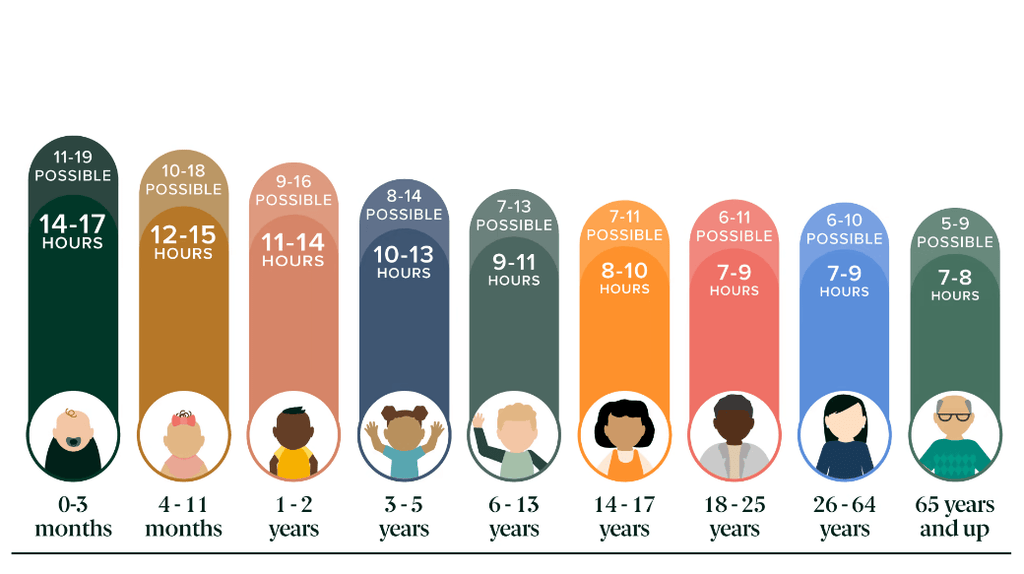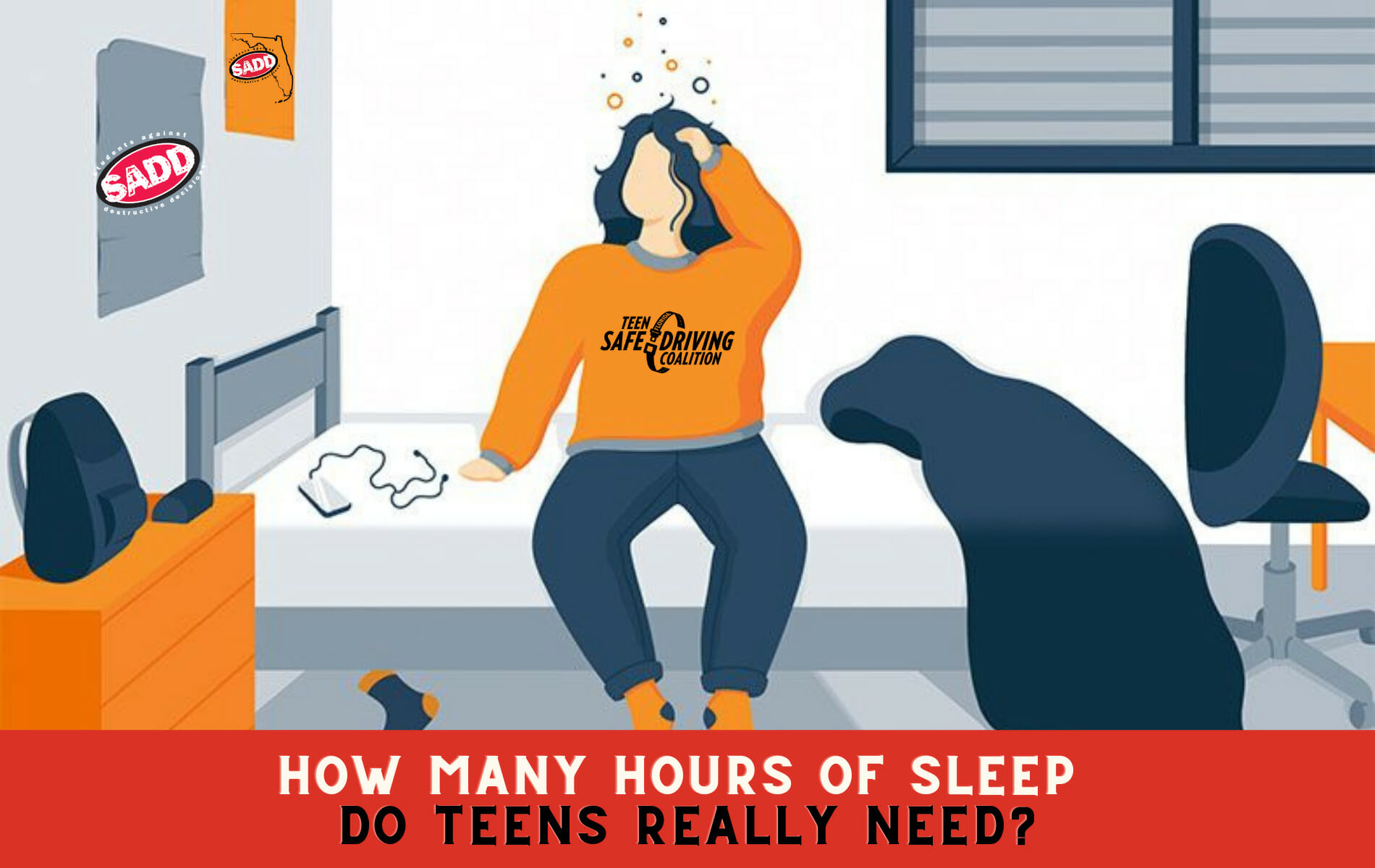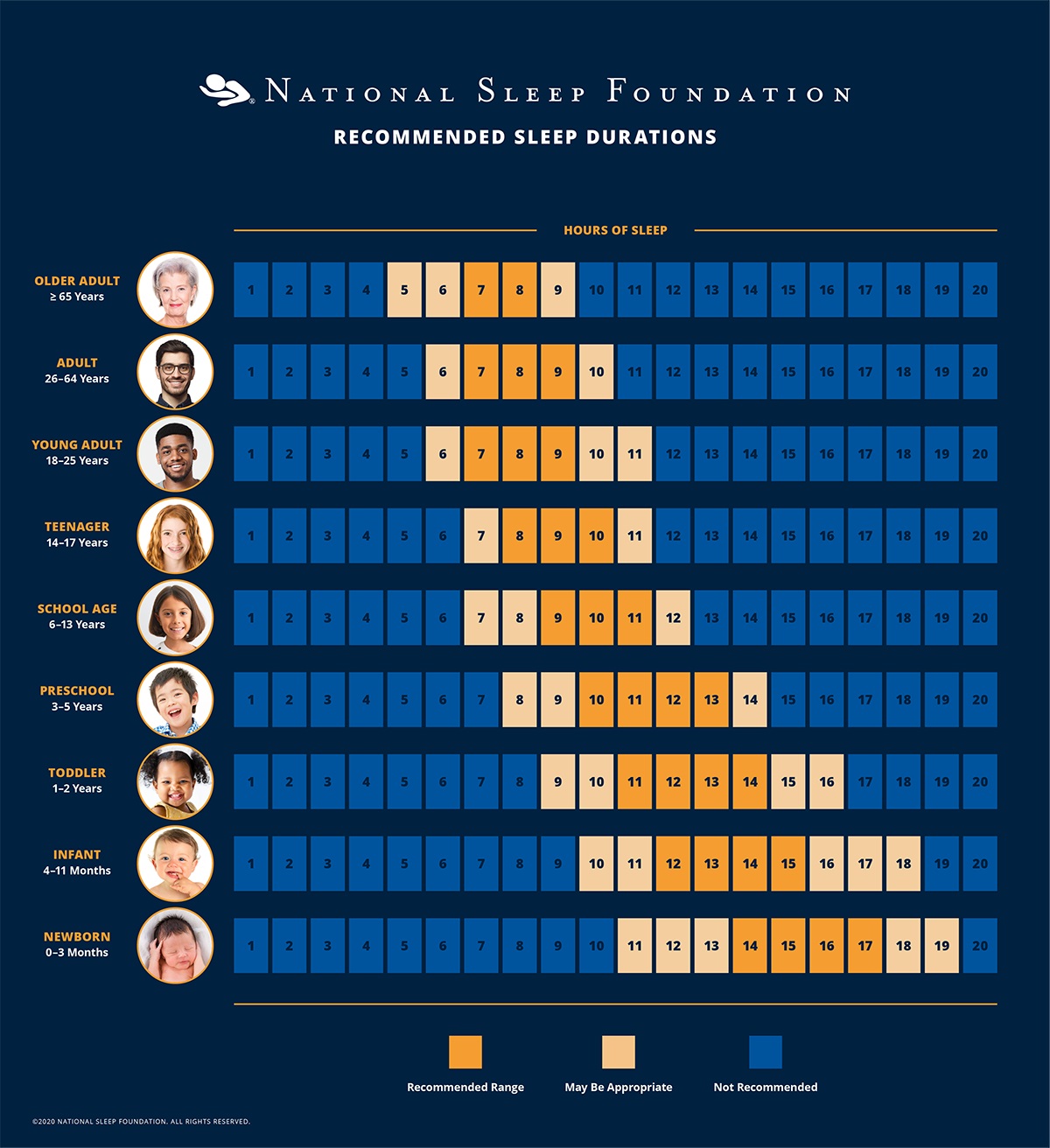Healthy adults need at least seven hours of sleep per night. Babies, young children, and teenagers need even more sleep.
Getting adequate sleep is essential for overall health and well-being, with adults requiring around seven hours of sleep each night. While individual sleep needs may vary, meeting the recommended hours of sleep can promote improved cognitive function, mood, and physical health.
Understanding the importance of sleep and prioritizing sufficient rest can contribute to a healthier and more productive lifestyle. Furthermore, establishing a consistent sleep schedule and creating a comfortable sleep environment can encourage better sleep quality. Additionally, practicing relaxation techniques and avoiding stimulants before bedtime can support the body's natural sleep-wake cycle. By recognizing the significance of adequate sleep and making it a priority, individuals can experience numerous benefits in their daily lives.
Amount Of Sleep Needed
Getting enough sleep is crucial for maintaining good health and overall well-being. The amount of sleep you need can vary depending on your age and stage of life. Understanding the recommended sleep durations can help you prioritize your sleep and ensure you are getting enough restorative rest.
7-9 Hours For Adults
For healthy adults, the National Sleep Foundation recommends getting between 7 and 9 hours of sleep each night. This allows your body and mind to fully recover from the demands of the day and ensures optimal cognitive function, mood regulation, and overall health. When you consistently get enough sleep, you are more likely to be productive, focused, and energized throughout the day.
More For Babies, Children, And Teens
Babies, children, and teenagers require more sleep than adults to support their growth and development. The exact amount of sleep needed varies depending on age:
- Newborns: Newborns typically require 14 to 17 hours of sleep per day. Their sleep is usually divided into shorter periods throughout the day and night.
- Infants: Infants aged 4 to 11 months need about 12 to 15 hours of sleep, usually including both daytime naps and a longer stretch of sleep at night.
- Toddlers: Toddlers aged 1 to 2 years require about 11 to 14 hours of sleep, which may consist of a single long nap during the day and nighttime sleep.
- Preschoolers: Preschoolers aged 3 to 5 years typically need 10 to 13 hours of sleep, preferably with fewer daytime naps as they transition to a more consolidated overnight sleep schedule.
- School-Age Children: School-age children aged 6 to 12 years should aim for 9 to 12 hours of sleep to support their physical and cognitive development.
- Teens: Teenagers aged 13 to 18 years require 8 to 10 hours of sleep, as they continue to grow and face increased academic and social demands.
Ensuring that babies, children, and teens get adequate sleep is essential for their overall health, learning, and emotional well-being. It is important to establish consistent sleep routines and create a conducive sleep environment to facilitate healthy sleep habits.

Credit: www.zinus.com
Factors Affecting Sleep Needs
Getting enough sleep is crucial for our physical and mental well-being. The number of hours of sleep required for optimal health can vary based on several factors. These factors influencing sleep needs can include age, gender, and brain function.
Age
Age plays a significant role in determining how much sleep an individual requires. Newborns typically need 14-17 hours of sleep, while toddlers and young children may benefit from 10-14 hours. Teenagers generally require 8-10 hours, and adults often need 7-9 hours of sleep each night to function at their best.
Gender
Research suggests that biological differences between males and females can impact their sleep needs. Women, particularly during pregnancy and menopause, may need more sleep than men. Hormonal fluctuations and physiological changes can influence sleep patterns, making it essential for women to prioritize sufficient sleep to support their overall health and well-being.
Brain Function
Individual variations in brain function can also affect sleep needs. Factors such as stress, anxiety, and cognitive demands can impact the quantity and quality of sleep required. For instance, individuals with high cognitive demands at work or school may need more sleep to support optimal brain function and performance.
Benefits Of Sufficient Sleep
Getting enough sleep is crucial for maintaining overall health and well-being. Restorative sleep is linked to several benefits that promote a healthy lifestyle. From improved health to enhanced cognitive function, the positive effects of sufficient sleep cannot be overstated.
Improved Health
Sufficient sleep is essential for maintaining a healthy immune system, reducing the risk of chronic diseases, and supporting physical well-being. Adequate rest helps to regulate hormones, including those that control appetite and metabolism, which can contribute to maintaining a healthy weight.
Enhanced Cognitive Function
Quality sleep is directly related to cognitive processes such as memory, problem-solving, and decision-making. It promotes mental acuity, allowing individuals to focus better, learn efficiently, and retain information effectively.

Credit: flteensafedriver.org
Tips For Getting Quality Sleep
Quality sleep is crucial for overall health and well-being. When we don't get enough sleep, it can lead to various health issues and impact our daily productivity. Establishing a routine and creating a restful environment are two key factors that can help us get the quality sleep we need. Here are some tips on how to achieve that:
Establish A Routine
Having a consistent sleep routine can significantly improve the quality of your sleep. Try to go to bed and wake up at the same time every day, even on weekends. This helps regulate your body's internal clock and establishes a pattern that supports healthy sleep. Additionally, having a pre-bedtime routine, such as reading a book or taking a warm bath, can signal to your brain that it's time to wind down and prepare for sleep.
Create A Restful Environment
Your sleep environment plays a crucial role in the quality of your sleep. Make sure your bedroom is quiet, dark, and cool. Consider using earplugs, blackout curtains, or a white noise machine to minimize any disturbances. It's also essential to have a comfortable mattress, pillows, and bedding that support your sleep posture. Keep electronic devices out of the bedroom and avoid using them right before bed, as the blue light emitted from screens can interfere with your sleep.
Furthermore, creating a relaxing atmosphere by incorporating calming scents, such as lavender, or using a diffuser with essential oils can promote a sense of tranquility and aid in falling asleep faster. Additionally, engaging in a relaxation technique, such as deep breathing or meditation, before bed can help release tension and prepare your mind and body for a restful night's sleep.
Other Tips
- Avoid consuming caffeine, nicotine, and alcohol close to bedtime, as they can disrupt your sleep patterns.
- Exercise regularly, but try to finish your workout at least a few hours before bedtime to allow your body to wind down.
- Avoid large meals and spicy foods before bedtime, as they can cause indigestion and discomfort.
- Create a comfortable and inviting sleep environment by removing clutter and keeping the room tidy.
- Consider using a sleep mask or earplugs if you are sensitive to light and noise.
- Limit daytime napping, especially in the late afternoon or evening, as it can interfere with your ability to fall asleep at night.
By following these tips and incorporating healthy sleep habits into your routine, you can improve the quality of your sleep and wake up feeling refreshed and energized every morning.

Credit: www.thensf.org
Frequently Asked Questions For How Many Hours Of Sleep Do
How Many Hours Of Sleep Is Healthy?
Healthy adults need at least seven hours of sleep per night. Babies, young children, and teens need even more sleep for their growth and development.
How Many Hours Of Sleep Do I Need A Day?
Adults need at least 7 hours of sleep per night for good health. Babies, young children, and teenagers require even more sleep to support their growth and development.
How Much Sleep Do I Need By Age?
Healthy adults need at least seven hours of sleep per night. Babies, young children, and teens need even more sleep for growth and development.
Do I Need 7 Or 9 Hours Of Sleep?
Most adults need at least seven hours of sleep per night for good health. Babies, children, and teens need more sleep for growth and development.
How Many Hours Of Sleep Do I Need For Optimal Brain Function?
A healthy adult needs a minimum of seven hours of sleep per night to ensure optimal brain function.
Conclusion
The amount of sleep you need depends on your age and individual needs. While adults typically require at least seven hours of sleep per night for optimal health, babies, children, and teenagers need even more sleep to support their growth and development.
It's important to prioritize quality sleep and establish consistent bedtime routines to ensure you're getting the rest you need. Remember, sleep plays a vital role in overall well-being and should not be underestimated.






0 Comments